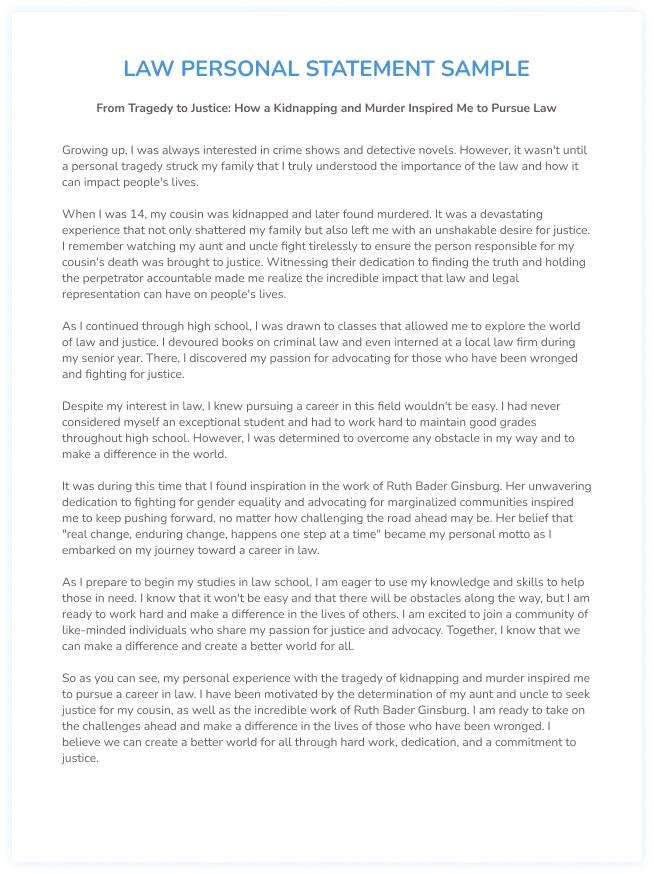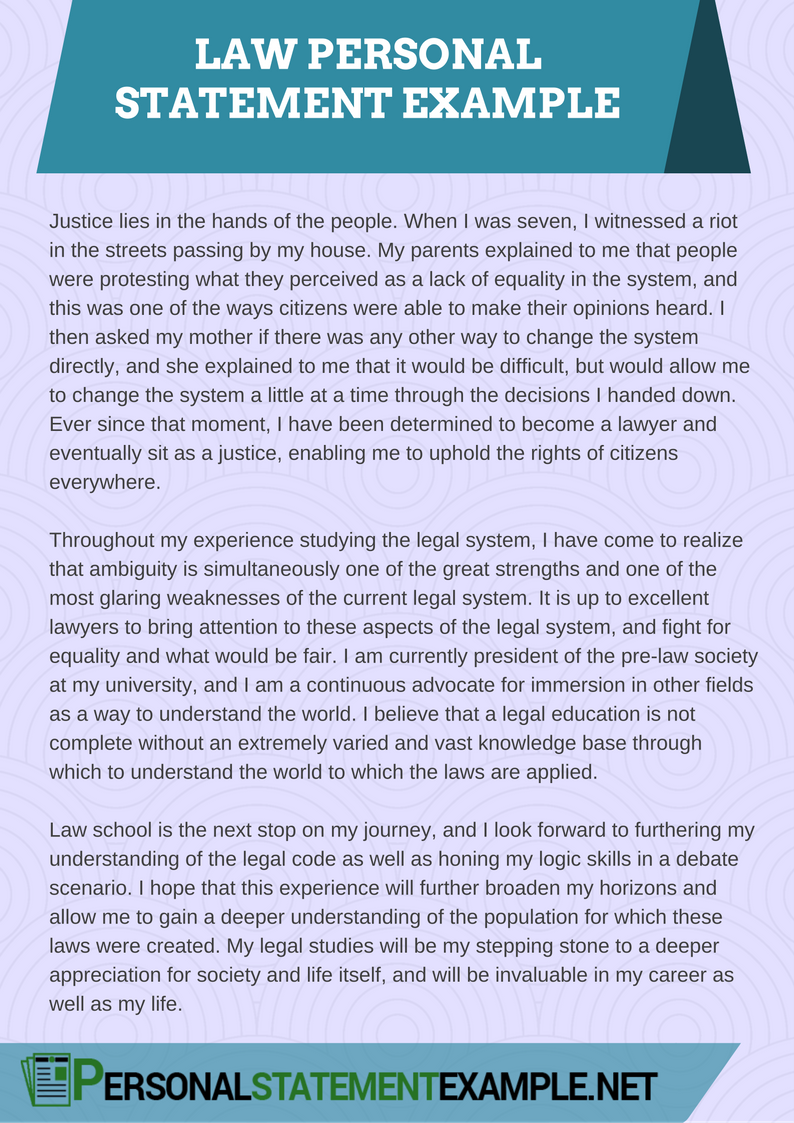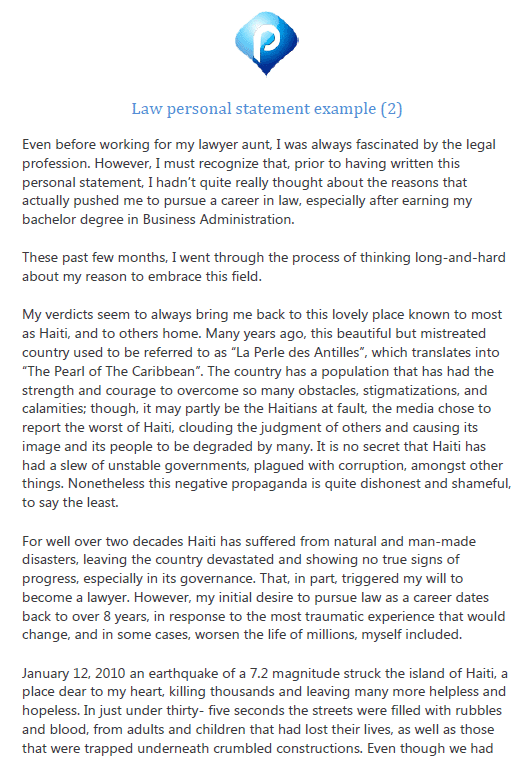Writing a law personal statement can be challenging. It’s your chance to shine and stand out.
Your personal statement plays a vital role in your law school application. It’s more than just a resume; it’s your story. This is where you share your passion, experiences, and goals. A well-crafted statement can make a big difference. It’s not only about what you’ve done but also about who you are.
Real examples can help you understand what works and what doesn’t. They provide a guide to structure and content. Let’s dive into some law personal statement examples to inspire and assist you.

Importance Of A Strong Personal Statement
The importance of a strong personal statement cannot be overstated. For aspiring law students, a well-crafted personal statement can be the difference between acceptance and rejection. It’s your chance to show the admissions committee who you are beyond test scores and grades.
First Impressions Matter
A strong personal statement creates a positive first impression. It introduces you to the admissions team in a memorable way. Your opening sentence should grab their attention. Use a compelling anecdote or a powerful quote to start. This sets the tone for the rest of your statement.
Remember, first impressions can shape the reader’s perception. A clear, engaging introduction can make your application stand out. Avoid clichés and overused phrases. Be original and authentic in your writing.
Standing Out From The Crowd
Thousands of students apply to law schools each year. A unique personal statement helps you stand out. Highlight your experiences and achievements. Share stories that showcase your passion for law.
Use specific examples to illustrate your points. Mention any internships, volunteer work, or relevant courses. Explain how these experiences have prepared you for law school. Focus on qualities that make you a strong candidate. Demonstrate your commitment to the legal profession.
Consider using a table to organize your achievements:
| Experience | Description | Impact |
|---|---|---|
| Internship at Law Firm | Assisted attorneys with case research | Enhanced research skills |
| Volunteer at Legal Aid Society | Helped clients with legal issues | Developed empathy and communication skills |
| Mock Trial Participant | Competed in mock trial competitions | Improved public speaking and critical thinking |
Use bullet points to emphasize key attributes:
- Strong analytical skills
- Excellent written and verbal communication
- Demonstrated leadership abilities
- Commitment to justice and advocacy
A well-structured personal statement makes a significant impact. It shows you have taken the time to present your best self. Aim for clarity, conciseness, and relevance in every paragraph.
Understanding Your Audience
Writing a law personal statement can be challenging. It’s important to know who will read your statement and what they are looking for. Understanding your audience will help you tailor your statement to their expectations. This will increase your chances of making a strong impression.
Who Will Read Your Statement?
Admission officers at law schools will read your statement. They are often experienced professionals. They review many applications. They look for unique and compelling stories. Your statement must stand out.
What Are They Looking For?
Admission officers seek applicants with a clear passion for law. They want to see your dedication and commitment. They look for evidence of your problem-solving skills. They also value strong communication skills.
Highlight your past experiences that relate to law. Share any relevant volunteer work or internships. Mention any challenges you overcame. Show how these experiences shaped your desire to study law.
Structuring Your Personal Statement
Writing a personal statement for law school can be challenging. A clear structure helps. This structure guides your thoughts and makes your statement engaging. Let’s break down the key parts of a well-structured personal statement.
Opening Paragraph
The opening paragraph is your chance to grab attention. Start with a strong, interesting sentence. Make it personal. Explain why you want to study law. This is your first impression. Make it count.
| Good Opening | Weak Opening |
|---|---|
| “Since I was young, I have been fascinated by the law.” | “I want to study law because it is an interesting field.” |
Body Paragraphs
The body paragraphs provide details about your skills and experiences. Use specific examples. Show how your background prepares you for law school. Highlight your achievements. Explain any challenges you have overcome.
Consider using bullet points for clarity:
- Educational Background: Mention your degrees and relevant coursework.
- Work Experience: Discuss internships or jobs related to law.
- Personal Qualities: Describe traits like leadership, determination, and ethics.
Use short paragraphs. Each one should cover a single idea. This helps keep your statement clear and easy to read.
The conclusion ties everything together. Summarize your main points. Reaffirm your passion for law. End with a strong statement about your future goals. Show confidence in your decision to study law.
Here’s an example of a strong concluding sentence:
“I am eager to contribute to the field of law and make a positive impact.”
Showcasing Your Passion For Law
Showcasing your passion for law is crucial in a personal statement. Law schools seek students with a genuine interest in the field. Highlighting personal experiences and inspirational anecdotes can make your application stand out.
Personal Experiences
Personal experiences can greatly influence your choice to pursue law. Reflect on moments that ignited your interest. Did a family member face a legal challenge? Did a school project on legal studies capture your attention? Sharing these stories can connect you with the reader.
Example:
“During high school, I volunteered at a local legal aid clinic. I saw firsthand how legal support can change lives. This experience solidified my desire to study law. I want to make a difference in my community.”
Such experiences show your commitment and provide a personal touch to your statement.
Inspirational Anecdotes
Inspirational anecdotes can also highlight your passion for law. Think about events or people who have inspired you. Was there a lawyer or a case that influenced your decision? Sharing these stories can demonstrate your enthusiasm.
Example:
“I was deeply inspired by the work of Ruth Bader Ginsburg. Her dedication to gender equality and justice inspired me to pursue a career in law. I aspire to continue her legacy and fight for the rights of the marginalized.”
These anecdotes show your motivation and connect your aspirations to real-world examples. It makes your passion relatable and genuine.
Highlighting Academic Achievements
Highlighting academic achievements in a law personal statement can set you apart. It shows dedication, knowledge, and the skills you’ve developed. Let’s dive into some key areas to showcase your academic strengths.
Relevant Coursework
List courses related to law. Mention courses like Constitutional Law, Criminal Law, and Contract Law. These courses show your foundational knowledge. Explain how these courses have shaped your understanding of the legal system.
For example, studying Constitutional Law might have given you insights into the structure of government. Discuss how this course helped you understand complex legal principles. This demonstrates your analytical skills and ability to grasp detailed concepts.
Research And Projects
Detail any research projects you’ve completed. Focus on projects with legal implications. Describe the research topic and your findings. Explain the methodologies you used. This highlights your ability to conduct thorough research.
For instance, if you researched the impact of a new law, outline your process. Mention data collection, analysis, and conclusions. This shows your attention to detail and ability to work independently.
Highlight group projects too. If you led a team, describe your leadership role. Explain how you coordinated efforts and ensured project success. This shows your collaboration and leadership skills.

Demonstrating Relevant Skills
Demonstrating relevant skills in your law personal statement is crucial. It helps showcase your suitability for a career in law. Highlighting skills like critical thinking and communication can set you apart. These skills are key to excelling in the legal field. Below are some ways to effectively demonstrate these skills.
Critical Thinking
Critical thinking is essential for any aspiring lawyer. It involves analyzing facts and forming a judgment. Mention experiences where you solved complex problems. For example, discuss a project where you had to evaluate different perspectives. This shows your ability to think deeply and make informed decisions.
Describe situations where you identified key issues and resolved them. This could be in a debate club or a research project. Show how you applied logic and reasoning. Explain the steps you took to reach a conclusion. This demonstrates your analytical skills and attention to detail.
Communication Skills
Strong communication skills are vital in law. Lawyers need to present arguments clearly and persuasively. Share examples where you demonstrated effective communication. This could be through public speaking or writing tasks. Mention any experience in a moot court or as a student representative.
Explain how you conveyed your ideas clearly and confidently. Highlight any feedback you received on your communication skills. Show that you can articulate complex ideas in a simple manner. This will emphasize your ability to engage and persuade your audience.
Addressing Challenges And Growth
Writing a law personal statement requires more than just academic achievements. Addressing challenges and growth can make your application stand out. This section highlights how overcoming obstacles and learning from experiences can shape a compelling narrative.
Overcoming Obstacles
Obstacles can shape your character. They test your resolve and determination. A good personal statement shows how you faced these challenges. For instance, balancing schoolwork with part-time jobs demonstrates dedication and time management skills. Overcoming a difficult subject or legal concept shows perseverance. Write about these experiences. Highlight the skills you gained. This makes your story relatable and inspiring.
Lessons Learned
Every challenge brings a lesson. Reflect on what you learned from your struggles. Did you discover new strengths? Maybe you learned the importance of resilience. Perhaps you found better study methods or time management techniques. Share these insights. They show personal growth and maturity. These lessons make you a stronger law candidate. They also prove your ability to handle future challenges in law school.

Editing And Refining Your Statement
Writing a personal statement for law school is just the beginning. Editing and refining your statement is crucial to ensure it is polished and professional. This process involves several steps to make your statement clear and compelling. Below, we discuss two key aspects: proofreading and seeking feedback.
Proofreading Tips
Proofreading is more than just checking for spelling errors. Follow these tips to make your statement error-free:
- Read aloud: This helps catch awkward sentences.
- Take breaks: Rest your eyes to spot mistakes better.
- Use tools: Online tools can find grammar issues.
- Check punctuation: Ensure commas and periods are in place.
- Consistency: Keep your tone and style uniform.
Seeking Feedback
Getting feedback is vital to refining your statement. Here’s how to do it effectively:
- Ask trusted people: Choose those who know you well.
- Seek diverse opinions: Different perspectives can reveal hidden issues.
- Be open to criticism: It helps improve your statement.
- Focus on clarity: Ensure your message is clear.
- Revise accordingly: Make changes based on the feedback.
Frequently Asked Questions
What Should A Law Personal Statement Include?
A law personal statement should include your motivation for studying law, relevant experiences, and skills. Highlight your academic achievements and career aspirations. Ensure you reflect on your passion for law and your understanding of the subject.
How Do I Start A Law Personal Statement?
Start your law personal statement with a compelling introduction. Capture attention with a personal anecdote or a relevant quote. Clearly state your motivation and enthusiasm for studying law.
How Long Should A Law Personal Statement Be?
A law personal statement should typically be around 500-800 words. Ensure it is concise, focused, and free of unnecessary details. Stick to the word limit specified by the institution.
Can I Use Quotes In My Personal Statement?
Yes, you can use quotes in your personal statement. Ensure the quote is relevant and adds value to your narrative. Avoid overusing quotes, and make sure they enhance your personal story.
Conclusion
Crafting a compelling law personal statement is crucial. It showcases your passion and qualifications. Use clear, concise language. Highlight your experiences and skills. Make your personality shine through your writing. Tailor each statement to the specific law program. Avoid clichés and generic phrases.
Proofread carefully to eliminate errors. A well-written statement can make a strong impression. It can help you stand out in a competitive field. Follow these tips for a successful application. Good luck!





